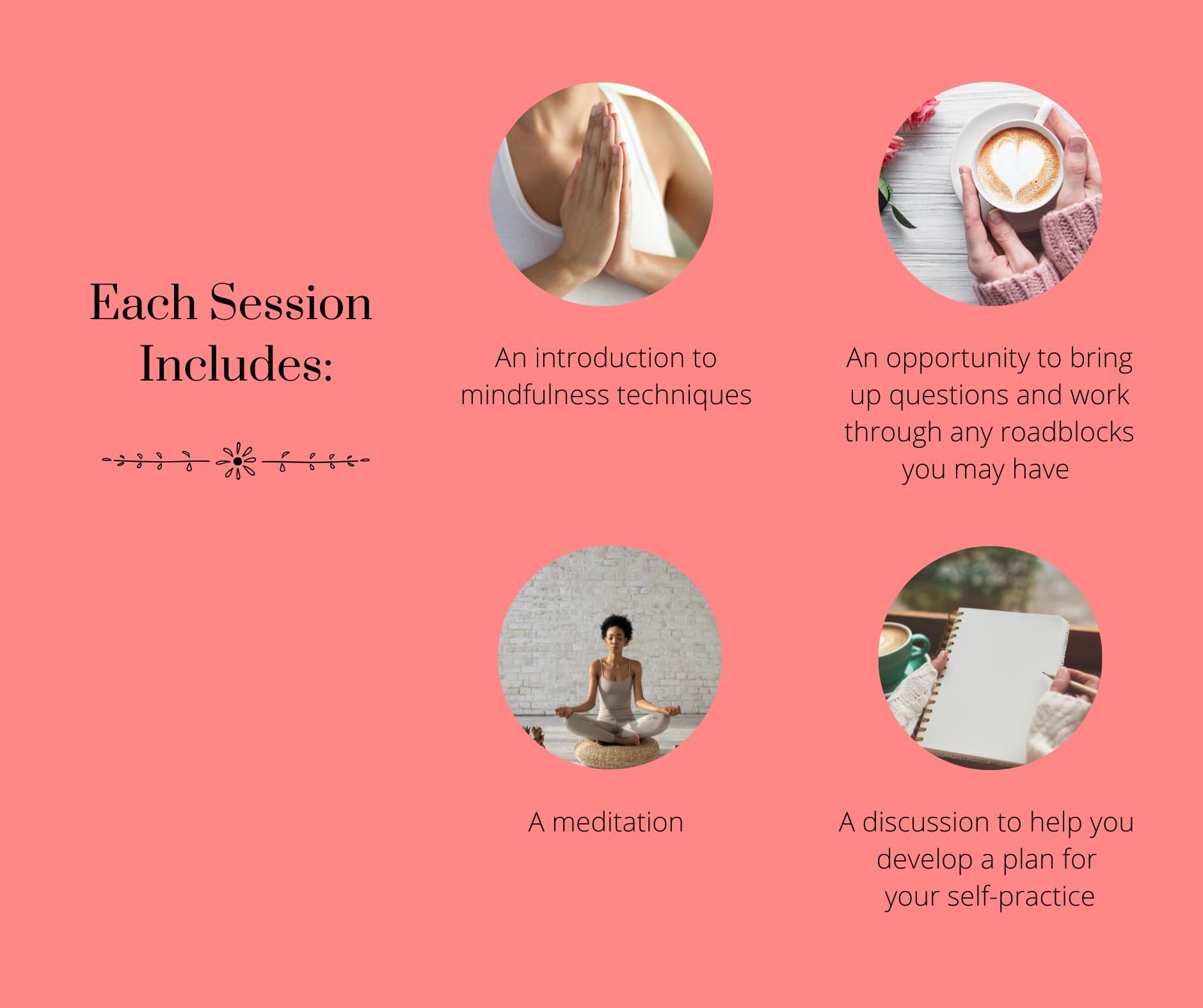Welcome to Rocky Trails and Rainbows Coaching!
Take a look at the coaching packages below to discover what Rocky Trails and Rainbows has to offer.
Mindful Living Coaching Package
Are you tired of feeling like life is rushing by too quickly? If so, the key to curbing your stress and taking control of your time may be through the practice of mindful living. In a world that encourages speed and instant gratification, it’s easy to feel overwhelmed and like time is slipping away. However, mindful living can help you slow down and find peace in the present moment.
When we’re constantly rushing, we miss out on the small moments that can bring us so much joy. We’re busy scrolling through our phones, multitasking, and connecting with others without being fully present. The fast-paced lifestyle we lead is often stressful and overwhelming, leaving us feeling frazzled and unfulfilled. By adopting a mindful approach to life, we can slow down and savor the world around us. We become more deeply connected with others and find greater purpose in our lives.
Mindful living is synonymous with slow living. The slow living movement is a lifestyle trend that emphasizes the need to slow down and simplify our lives in order to reduce stress, improve our well-being, and connect more deeply with ourselves and our surroundings. Some of the characteristics of the slow living movement include practicing mindfulness, slowing down to enjoy life’s simple pleasures, simplifying our lives, and thinking about sustainability. The slow living movement is all about taking a step back from our fast-paced, consumer-driven culture and embracing a simpler, more mindful way of life.
By doing so, we can reduce stress, improve our well-being, and create a more sustainable and fulfilling future for ourselves and our planet.
When I decided to be mindful and simplify my life, I realized that my schedule was one of the main areas that needed attention. I had to take control of my time and live more intentionally. By doing so, I found that time seemed to slow down, and the moments I spent with my family became more meaningful. Now we can enjoy our time together without feeling rushed or stressed out.
If you’re interested in joining the mindful living movement, there are a few things to keep in mind. Mindful living requires a deliberate, intentional effort. It means being present in the moment and taking control of your time. In this way, you can create a more meaningful, purposeful life that is full of joy and fulfillment.
Together, we will work on:
Organizing and decluttering the spaces in your home and in your mind
When we organize our lives, we tend to let go of the things that no longer serve us, such as physical clutter in our living spaces or mental clutter in our minds. By organizing, we become clear-minded and less stressed. Organizing our environment can do wonders for our mental state, as cluttered spaces lead to a cluttered mind, while a tidy environment promotes peace of mind and clarity.
When we’re surrounded by mess and chaos, it can be hard to relax and unwind. We can create a more calming atmosphere that promotes relaxation and reduces stress by tidying up and creating a more organized space. It will also improve our mood and help us to feel more positive.
A cluttered space can be distracting and make it difficult to focus on the tasks at hand. By organizing our environment, we can create a more efficient workspace that promotes productivity and helps us stay on task.
Simplifying your life in the areas you need it the most
Simplifying our lives can help us to manage our time more effectively. By setting boundaries and reducing our commitments and obligations, we can create more space in our schedules for the things that matter most. With fewer distractions and less clutter, we can focus more on what truly matters to us, such as our relationships, hobbies, or work. When we have a clear sense of our priorities, we can spend our time and energy on the things that bring us the most joy and fulfillment.
We can work on simplifying our habits and daily routine to make more time for people and activities we love.
In this process, you will learn:
Some basic mindfulness techniques and slow living ideas
Mindfulness techniques may include mindful posture, mindful walking, mindful listening, mindful eating, and mindfulness in daily tasks.
Ideas for slow living may include spending time in nature, focusing on your health, finding more time for personal relationships, and creating inviting spaces in your environment that you love and feel comfortable in.
Self-care techniques to help ground you, make you feel refreshed, and allow you to show up the best for yourself and others
Self-care can take many forms, and we will work together to find what works best for you. Self-care can include anything from taking a relaxing bath or practicing yoga to spending time outdoors or reading a good book. Prioritizing self-care can help to reduce stress and anxiety, which can have a positive impact on both our mental and physical health. When we take care of ourselves, we’re better equipped to show up for others. We’re more patient, empathetic, or simply more present in our interactions with loved ones. It’s important to remember that self-care is not selfish. Taking care of ourselves can make us better able to care for others in the long run. When we make self-care a priority, we’re investing in our well-being and our ability to show up as our best selves.
Coaching packages include weekly 45-minute sessions with email support between calls.
Prices range from $1500 - $1800.
Contact me for more information. I’m happy to provide a complimentary consultation over the phone to meet you and answer any questions you may have.
Self-Love Coaching Package
What is self-love?
Self-love is an essential part of living a healthy and successful life. It requires moving away from self-rejection and instead embracing oneself with kindness. Self-love is about making the conscious decision to put your well-being first, taking care of yourself, and advocating for your needs. Furthermore, it involves being mindful of the people and circumstances that you choose to associate with and how those will benefit yourself and your ambitions. Making these important decisions demands reflection, self-awareness, and a commitment to protecting yourself. Investing in self-love is undoubtedly an empowering way to maximize potential in all aspects of life.
Developing and increasing your self-love is not all about bubble baths and gifts, although these could be part of the equation. For real, honest, and deep self-love, it’s important to understand that self-love is not about constantly giving in to every whim or desire. Instead, it’s about engaging in behaviors that help you to grow as a person and live up to your fullest potential. It involves challenging yourself, accepting yourself as you are, setting boundaries with others, motivating yourself, showing kindness and respect for yourself in everything you do, having faith in your abilities and capabilities, and solving problems constructively rather than focusing on obstacles. By engaging in these activities while being compassionate with yourself through any mistakes or missteps made along the way, you cultivate a genuine self-love that can enhance your life more profoundly than any bath bomb or trinket.
Making a commitment to loving ourselves and practicing self-compassion is easier said than done. However, the rewards are endless. This work does not only improve the way we perceive our current selves but boosts our confidence for the future. Making a pledge for self-love encourages us to be mindful of our actions and gives us permission to make mistakes along the way. We must adopt an attitude of understanding toward ourselves. None of us are perfect, and that is okay! Learning to prioritize self-acceptance will bring us one step closer to developing a positive self-image and increased confidence in our authentic selves.
Together, we will work on increasing your self-love and self-confidence. We will implement self-care practices to support you and help you to feel your best.
Coaching packages include weekly 45-minute sessions with email support between calls.
Prices range from $1500 - $1800.
Contact me for more information. I’m happy to provide a complimentary consultation over the phone to meet you and answer any questions you may have.
Upcoming Summer of 2024: Mindfulness and Meditation Coaching Package
Contact me to sign up early and receive a 10% discount!
What is mindfulness?
Mindfulness is the practice of being present in the moment and paying attention to our thoughts, feelings, and surroundings without judgment. When practicing mindfulness, we strive to achieve moment-to-moment awareness. Mindfulness can help us to become more aware of our thoughts, feelings, and bodily sensations, which can lead to a greater understanding of ourselves and our behavior. Over time, we can train our minds to become more present and less reactive to thoughts and emotions that trigger stress and anxiety.
Benefits of practicing mindfulness
There are many benefits to practicing mindfulness, including reducing stress and anxiety, increasing focus and productivity, and improving mood and well-being. One of the best things about mindfulness is that it can be practiced anywhere at any time. You do not need any special equipment or training—all you need is your mind.
One of the primary benefits of mindfulness is that it helps us to live in the present. Too often, our minds are focused on the past or future, dwelling on things that we can no longer change or worrying about what might happen. This can lead to anxiety, depression, and other mental and physical health problems. Mindfulness helps us to break out of this cycle by bringing our attention back to the present moment. When we’re mindful, we’re more aware of our thoughts, emotions, and surroundings. We’re better able to appreciate the good things in our lives and are better able to cope with the challenges we face. Mindfulness can help us to become more self-aware so that we can manage difficult emotions in a healthy way. It can also help us to break negative thought patterns so that we can think more clearly and make better decisions.
What is meditation?
Meditation is an ancient practice and mental discipline that has been used for centuries to promote peace of mind and well-being. While meditation is often associated with religious traditions such as Buddhism, it is something that anyone can do, regardless of their beliefs. It does not require any specific beliefs or dogma. Many people use meditation as a spiritual practice, but for others, it can simply be a way to focus the mind and cultivate inner peace. There are many types of meditation and many ways to meditate. Some examples are guided meditation, body scan meditation, and walking meditation. Each type of meditation provides calming benefits and helps to cultivate mindfulness.
Benefits of meditation
Like mindfulness, meditation has numerous benefits and can be practiced anywhere.
Meditation is a great way to quiet the mind and promote peace and calm. It can reduce stress, help with clarity and focus, and can release tension in the body.
When we take time to be present and still our minds, we’re better able to connect with our innermost selves. We can learn to let go of negative thoughts and not get dragged down by our emotions. Meditation can help promote calm by allowing you to focus on your breath and become more aware of your thoughts and feelings. When you focus on your breath, you become more mindful of your body and the sensations you’re feeling. This can help you to become more aware of the physical and emotional states you’re in and help you relax.
Mindfulness and meditation are interconnected
Practicing mindfulness in our daily lives can help us to cultivate a deeper sense of awareness and presence that can be carried over into our meditation practice. When we practice mindfulness, we learn to observe our thoughts and emotions without judgment. This awareness is helpful when sitting down to practice meditation. Mindfulness can also help us to develop a greater sense of compassion for ourselves and others, which can be particularly helpful when we encounter challenging emotions or difficult situations in our meditation practice.
As we work together, I will provide you with tools for developing your mindfulness and meditation practice, and you will have the opportunity to discover what works best for you. Each week, I will introduce you to mindfulness techniques and guide you through a meditation, and each session will build on the others as you deepen your practice. By the end of our time together, you will have the tools to continue your mindfulness and meditation practice for years to come.
In this process, you will learn:
Mindfulness techniques
Breathing techniques
Styles of meditation, including body scan meditation, guided meditation, and walking meditation
Exercises that include art, yoga, journaling, and spending time in nature
Each session includes:
An introduction to mindfulness techniques
An opportunity to bring up questions and to work through any roadblocks you may have
A meditation
A discussion to help you develop a plan for your self-practice
Coaching packages include weekly 45-minute sessions with email support between calls.
Prices range from $1500 - $1800.
Contact me for more information. I’m happy to provide a complimentary consultation over the phone to meet you and answer any questions you may have.






